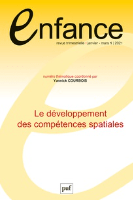
Enfance
Scope & Guideline
Transforming Perspectives on Childhood Through Rigorous Scholarship
Introduction
Aims and Scopes
- Child Development and Learning:
The journal emphasizes research on cognitive, emotional, and social development in children, exploring how various factors influence learning processes and educational outcomes. - Neurodevelopmental Disorders:
A significant focus is placed on understanding neurodevelopmental disorders such as autism and ADHD, including their diagnosis, treatment, and the impact on children's lives. - Parental and Family Influence:
Research examining the role of parenting styles, family dynamics, and educational interventions in shaping children's behaviors and development is a core theme. - Cultural and Contextual Factors:
The journal investigates how cultural contexts and societal structures affect children's development, with studies that explore educational practices across different environments. - Psychometric and Assessment Tools:
There is a consistent interest in developing and validating assessment tools for understanding children's cognitive and emotional abilities, ensuring evidence-based practices.
Trending and Emerging
- Participatory Research with Children:
There is a growing trend towards involving children in research processes, particularly regarding their well-being, emphasizing the importance of their voices in shaping educational and social policies. - Impact of Technology on Development:
The exploration of how technology, including artificial intelligence, influences children's learning and social interactions is an emerging area of interest. - Socio-emotional Development and Regulation:
Research focused on socio-emotional skills and regulation strategies in children and adolescents is gaining traction, reflecting an increased awareness of mental health and emotional well-being. - Interventions for Neurodevelopmental Disorders:
There is an increasing emphasis on developing and evaluating interventions specifically tailored for children with neurodevelopmental disorders, aiming to enhance their quality of life and educational outcomes. - Cultural Contexts in Education:
The influence of cultural backgrounds on children's learning and development is becoming a focal point, with studies examining how diverse cultural experiences shape educational practices.
Declining or Waning
- Traditional Intelligence Testing:
There appears to be a waning interest in traditional intelligence testing methodologies, which are increasingly viewed as limited and culturally biased. - Generalized Theories of Development:
Broad, generalized theories of child development are being replaced by more nuanced, context-specific studies that consider individual and cultural differences, leading to a reduced emphasis on one-size-fits-all approaches. - Historical Perspectives on Child Development:
Research that primarily focuses on historical figures and their theories, such as those of Henri Wallon, is becoming less prevalent as contemporary methodologies and findings gain prominence. - Non-evidence-based Interventions:
There is a noticeable decrease in studies advocating for interventions that lack empirical support, as the journal increasingly prioritizes evidence-based practices. - Exclusively Qualitative Studies:
While qualitative research remains important, there is a trend towards integrating quantitative methodologies, leading to a decline in purely qualitative studies.
Similar Journals

Early Childhood Education Journal
Shaping the Future of Early Childhood Learning.Early Childhood Education Journal is a premier scholarly publication dedicated to advancing the field of early childhood education through cutting-edge research and innovative practices. Published by Springer, this journal serves as a pivotal platform for educators, researchers, and policymakers interested in the developmental and educational psychology of young children. With an esteemed impact factor reflecting its significant influence, the journal ranks in the top quartile (Q1) for Education and in Q2 for Developmental and Educational Psychology, positioning it among the most respected avenues for scholarly exchange in these disciplines. The journal has been consistently publishing impactful research since its inception in 1995, fostering discussions that shape educational policies and practices globally. Although it maintains a subscription model, the accessibility of its research through esteemed databases ensures that vital knowledge reaches a broad audience, empowering practitioners and researchers alike to enhance educational outcomes for children. For those invested in the future of education, the Early Childhood Education Journal is an indispensable resource that bridges theory and practice.
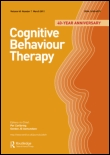
COGNITIVE BEHAVIOUR THERAPY
Elevating Understanding and Practice in CBTCOGNITIVE BEHAVIOUR THERAPY is a leading peer-reviewed journal focused on the clinical applications and advancements in cognitive-behavioral therapy (CBT), published by Routledge Journals, Taylor & Francis Ltd. Since its inception in 2002, the journal has rapidly gained prominence in the field of clinical psychology, currently holding a distinguished Q1 ranking in this category for 2023, as well as an impressive Scopus rank of #18 out of 311 journals, positioning it in the 94th percentile. This publication serves as a vital resource for researchers, professionals, and students alike, fostering rigorous scholarly discussions on innovative approaches, efficacy studies, and theoretical frameworks in CBT. The journal, accessible in both print and electronic formats (ISSN 1650-6073 and E-ISSN 1651-2316), aims to disseminate groundbreaking research that enhances the understanding and practice of cognitive-behavioral interventions, thereby contributing significantly to mental health care worldwide. Centered in Sweden, it reflects a commitment to academic excellence and global outreach in the psychosocial domain.
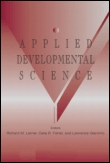
Applied Developmental Science
Connecting theory and practice in the realm of developmental science.Applied Developmental Science is a leading academic journal dedicated to enhancing the understanding of human development across the lifespan. Published by Routledge Journals, Taylor & Francis Ltd, this esteemed journal stands out in its field with a remarkable impact factor and prestigious Q1 classification in Applied Psychology, Developmental and Educational Psychology, and Life-span and Life-course Studies, as of 2023. By focusing on empirical research and innovative theoretical perspectives, Applied Developmental Science serves as a vital resource for researchers, professionals, and students alike, fostering a deep understanding of developmental processes. The journal’s high rankings highlight its influence and commitment to advancing knowledge in developmental psychology. Although not an open-access publication, it provides invaluable insights for those engaged in developmental science, making it a cornerstone for academic inquiry and professional practice within the discipline.
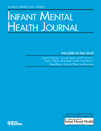
INFANT MENTAL HEALTH JOURNAL
Pioneering Research for Nurturing MindsThe INFANT MENTAL HEALTH JOURNAL, published by Wiley, is a leading peer-reviewed journal dedicated to advancing research in the fields of developmental and educational psychology, pediatrics, and mental health, with a strong emphasis on the psychological development of infants and young children. Since its inception in 1980, the journal has played a critical role in disseminating valuable insights and innovative methodologies that inform practices and policies affecting child welfare and mental health. With an impressive standing in both Developmental and Educational Psychology (Q2) and Pediatrics, Perinatology and Child Health (Q1), it ranks among the top journals in its field, as evidenced by its Scopus rankings. The journal is essential for researchers, clinicians, and students aiming to enhance their understanding of infant mental health and its implications for early development. By publishing high-quality research and reviews, the INFANT MENTAL HEALTH JOURNAL continues to shape the landscape of infant mental health research, fostering collaboration and exploration in this vital area of study.
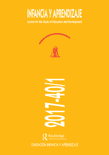
Journal for the Study of Education and Development
Advancing insights in education and development.The Journal for the Study of Education and Development, published by SAGE Publications Inc, is a leading academic peer-reviewed journal dedicated to advancing knowledge in the fields of educational and developmental psychology. Established in 1978 and operating through the United Kingdom, this journal provides a platform for contemporary research, theoretical discussions, and critical reviews that inform practices and policies in education. With an H-index reflecting its impact and citation metrics, it ranks in the Q3 category for both Developmental and Educational Psychology and Education as of 2023. Notably, it holds a Scopus rank of #722/1543 in Social Sciences - Education and #218/360 in Psychology - Developmental and Educational Psychology, placing it in the 53rd and 39th percentiles, respectively. The journal is committed to open access, ensuring that the insights found within its pages are readily available to researchers, professionals, and students alike. By contributing to ongoing dialogues and innovations in educational contexts, the Journal for the Study of Education and Development remains an essential resource for those looking to foster growth and development in educational settings.
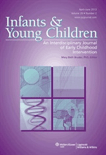
Infants & Young Children
Transforming Early Experiences into Lifelong BenefitsInfants & Young Children is a pioneering journal established in 1988 and published by Lippincott Williams & Wilkins, focusing on the critical developmental phases of infancy and early childhood. With a commitment to advancing research in Developmental and Educational Psychology, Pediatrics, Perinatology and Child Health, as well as Psychiatry and Mental Health, this journal serves as an essential resource for professionals and scholars dedicated to understanding and enhancing the early years of life. As a member of the Q3 category in multiple relevant fields, it informs and stimulates discourse with its impactful scholarly articles, meeting the diverse needs of researchers, practitioners, and policymakers alike. Though access is not currently open, subscribers can expect high-quality, peer-reviewed research that underscores the importance of early experiences in shaping lifelong outcomes. Located in Philadelphia, this journal continues to make significant contributions to child health and education, aiming to bridge gaps in knowledge and ensure a foundation for thriving, healthy futures.
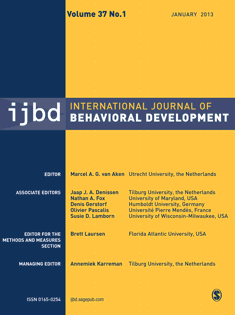
INTERNATIONAL JOURNAL OF BEHAVIORAL DEVELOPMENT
Advancing understanding of human growth and interactions.INTERNATIONAL JOURNAL OF BEHAVIORAL DEVELOPMENT, published by SAGE PUBLICATIONS LTD, is a premier academic journal dedicated to advancing the fields of developmental and educational psychology, developmental neuroscience, and social psychology. With an impressive impact factor and a Q1 ranking across multiple categories for 2023, this journal ranks among the top 25% in various social science domains, including education and lifespan studies. Its commitment to publishing high-quality research makes it an essential resource for researchers, educators, and students focused on understanding behavioral development across the lifespan. The journal aims to disseminate innovative findings, fostering a deeper comprehension of the behavioral factors that shape human growth and interactions. Through its rigorous peer-review process and global editorial standards, it not only enhances the academic conversation but also influences policy and practice in related fields. For more information, readers can access additional content through subscription or institutional access options.
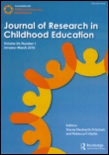
Journal of Research in Childhood Education
Inspiring change through evidence-based findings.The Journal of Research in Childhood Education, published by Routledge Journals, Taylor & Francis Ltd, is a prestigious academic journal that has been at the forefront of childhood education research since its inception in 1986. With an ISSN of 0256-8543 and E-ISSN 2150-2641, this journal serves an essential role in disseminating findings and discussions pertinent to the fields of developmental and educational psychology, as demonstrated by its notable rankings in the 2023 Scopus Ranks, placing it in the 66th percentile of Educational Social Sciences and 49th percentile in Developmental Psychology. With a current Q2 category quartile designation in both Developmental and Educational Psychology and Education, it aims to foster a deeper understanding of the complexities surrounding childhood education practices and policies. Researchers, educators, and students alike will find robust and insightful research that contributes to advancing educational theories and practices, supporting the journal's mission to enhance the overall quality of education for children globally. This journal continues to be a critical resource for individuals passionate about enhancing early childhood education and comprehending the developmental challenges faced by children today.

Revista de Psicologia Clinica con Ninos y Adolescentes
Bridging theory and practice in pediatric psychology.Welcome to the Revista de Psicologia Clinica con Ninos y Adolescentes, an esteemed academic journal published by UNIV MIGUEL HERNANDEZ, DEPT PSICOLOGIA, dedicated to advancing knowledge in the fields of clinical psychology, developmental psychology, and pediatric mental health. Since its inception in 2014, this Open Access journal has garnered a reputation for its commitment to disseminating cutting-edge research and practical insights, serving as an invaluable resource for researchers, practitioners, and students alike. With an impressive Q2 categorization across various disciplines in the 2023 rankings—including Clinical Psychology and Pediatrics—the journal holds significant merit in its rankings, demonstrating robust scholarly engagement. Nestled within the vibrant academic landscape of Spain, the journal aims to foster interdisciplinary collaboration and promote awareness of psychological issues affecting children and adolescents. By publishing high-quality empirical studies, theoretical papers, and reviews, the Revista de Psicologia Clinica con Ninos y Adolescentes plays a pivotal role in advancing the scientific dialogue within the field, making it an essential resource for anyone dedicated to improving mental health outcomes for younger populations.
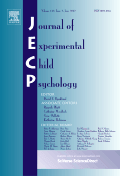
JOURNAL OF EXPERIMENTAL CHILD PSYCHOLOGY
Elevating Educational Practices with Groundbreaking ResearchJOURNAL OF EXPERIMENTAL CHILD PSYCHOLOGY, published by Elsevier Science Inc, stands as a premier outlet for high-quality research in the fields of Developmental and Educational Psychology and Experimental and Cognitive Psychology. With an impressive impact factor and recognized within the Q1 category for both developmental and experimental psychology, this journal is dedicated to advancing our understanding of child psychology through rigorous empirical research and theoretical contributions. Indexed with an ISSN of 0022-0965 and E-ISSN 1096-0457, it is a vital resource for scholars aiming to explore the complexities of children's cognitive, social, and emotional development from 1964 to 2024. Engaging with this journal provides researchers, professionals, and students access to cutting-edge findings that inform practice, policy, and future studies in the ever-evolving landscape of child psychology.